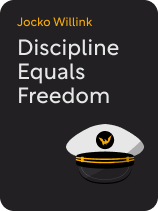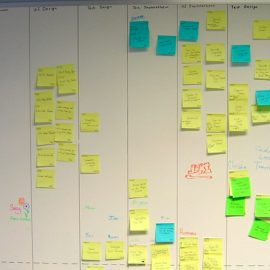

This article is an excerpt from the Shortform book guide to "Discipline Equals Freedom" by Jocko Willink. Shortform has the world's best summaries and analyses of books you should be reading.
Like this article? Sign up for a free trial here.
What is the importance of self-discipline? Why do you need to discipline yourself?
In his book Discipline Equals Freedom, Jocko Willink emphasizes the importance of self-discipline in terms of work and self-improvement. By implementing self-discipline in your life, you’ll stop procrastinating and become more productive.
Find out how important self-discipline is and why you need it in your everyday life.
The Importance of Self-Discipline
We’ll explain what self-discipline is, distinguishing it from motivation and external discipline. Then, we’ll explore the importance of self-discipline and why you should implement this discipline in your life.
What Is Self-Discipline?
Self-discipline is a steady, internal force that drives you to take action and “be better.” Willink explains that motivation or discipline from someone else—for instance, a motivational speaker or drill instructor—is a temporary influence that’s unreliable and outside your control. In contrast, self-discipline is consistent willpower that you exert over your mind and body enabling you to do what’s necessary to reach your goals despite your feelings or external influences.
Why You Need Self-Discipline
Willink gives four reasons you need self-discipline:
1. Self-discipline makes you the master of yourself. By cultivating and practicing discipline, Willink explains that you gain control over your thoughts and actions. This allows you to overcome bad habits, false excuses, distractions, and emotions to effectively accomplish daily tasks that lead to your long-term goals. Therefore, by removing self-imposed obstacles, discipline frees you to live the life you want most.
(Shortform note: In Crucial Conversations, the authors explain that you can learn to control your emotions by understanding how emotions form and manipulating a key step in this process: your interpretation of emotional triggers. Whenever you perceive a trigger, you naturally tell yourself a story about what you perceived, which influences your emotional response and ultimately, your actions. By controlling the story you tell yourself, you control the way you feel. Knowing this can help you effectively steer your emotions in ways that lead to disciplined action.)
2. Self-discipline makes you healthier. When you take control over your actions, you have the power to resist unhealthy temptations. Instead, you’ll be able to develop and maintain habits that keep you healthy—like a clean, nourishing diet and a regular exercise routine.
(Shortform note: Health professionals recognize the crucial role of discipline in good health. Describing the basics of weight loss, Mayo Clinic highlights commitment to changes in diet and exercise habits as the key to successful weight loss. In this context, “commitment” seems nearly synonymous with Willink’s definition of “discipline.” That is an internal force that drives you to take action and improve. However, Mayo Clinic’s idea of commitment seems to differ from Willink’s idea of self-discipline in that it’s not limited to an isolated, internal struggle for self-control. The Mayo Clinic suggests recruiting your doctor and loved ones for support in your health journey.)
3. Self-discipline helps you reach your goals and realize your full potential. Most of us have dreams and aspirations about things we want to accomplish or the type of person we want to be. Willink contends that even if you don’t have a clear vision for yourself, you’re likely capable of many great things. You might even have talents or resources to make certain goals more attainable. However, it’s discipline that helps you take control of your life and drive the actions necessary to develop good habits, reach your goals, and become the best version of yourself.
(Shortform note: The 5 AM Club discusses practical ways to discover your potential through discipline. This starts with waking up at—you guessed it—5 a.m. and using the first hour of your day to perform a self-improvement routine consisting of exercise, reflection, and professional growth.)
4. Self-discipline makes you happier. Willink believes that you achieve happiness by earning it. When you commit to bettering yourself through discipline in pursuit of your goals, you’ll find happiness along the way. Though Willink doesn’t explain exactly why or how you find happiness in the process of practicing discipline, we can infer that discipline makes you happier because the process of steadily bettering yourself will lead you to feel more healthy, confident, and satisfied.
(Shortform note: Psychologists define happiness as a positive emotion associated with personal fulfillment and satisfaction with your life. To cultivate satisfaction and fulfillment in your life, one expert recommends practicing daily skills like gratitude, accepting what you can’t control, building relationships, and finding meaning in your life. Perhaps applying Willink’s teachings about self-discipline to execute these skills more regularly and effectively will lead to more fulfillment, satisfaction, and happiness.)

———End of Preview———
Like what you just read? Read the rest of the world's best book summary and analysis of Jocko Willink's "Discipline Equals Freedom" at Shortform.
Here's what you'll find in our full Discipline Equals Freedom summary:
- Lessons and the philosophy of discipline from a Navy SEAL
- The importance of daily habits like waking up early and putting off breaks
- How self-sabotage actually stems from laziness






